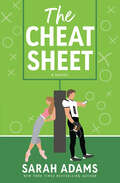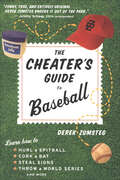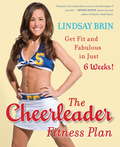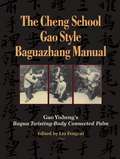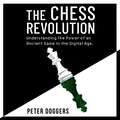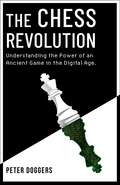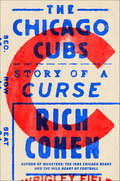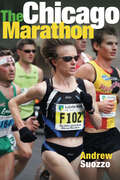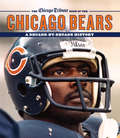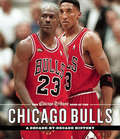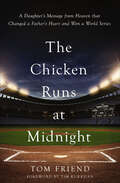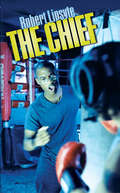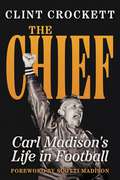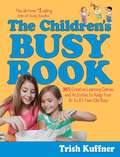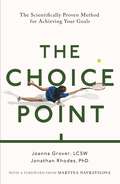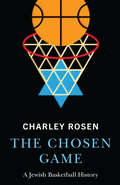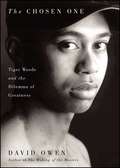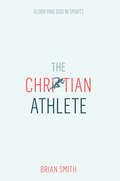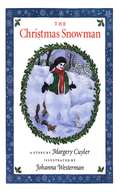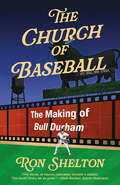- Table View
- List View
The Cheat Sheet: A Novel
by Sarah AdamsIs it ever too late to leave the friend zone? Discover the heartwarming friends to lovers romance that became a sensation on TikTok!The friend zone is not the end zone for Bree Camden, who is helplessly in love with her longtime best friend and extremely hot NFL legend, Nathan Donelson. The only problem is that she can&’t admit her true feelings, because he clearly sees her as a best friend with no romantic potential, and the last thing Bree wants is to ruin their relationship. But those abs . . .Nope! Nothing but good old-fashioned, no-touching-the-sexiest-man-alive, platonic friendship for Bree. In any case, she has other things to worry about. After a car accident ended her chance at becoming a professional ballerina, Bree changed paths and now owns her own dance studio, with big dreams to expand it. But one more rent increase could mean the end of the studio entirely.Then, as usual, Nathan comes to the rescue and buys the entire building. A stubborn Bree is not happy about it and decides to rebel with a couple—okay, maybe more than a couple—of tequila shots. Then her plan backfires as she spills her deepest, darkest secret to a TMZ reporter. One viral video later, the world thinks Nathan and Bree are the perfect couple. Before they can really talk about her confession, Nathan&’s publicist proposes a big opportunity that could mean financial security for Bree. The catch? They have to pretend to be in love. For three whole weeks.What will happen when Bree gives in to the feelings she&’s been desperately hiding for so long, and could she be imagining that Nathan is actually enjoying it? Sarah Adams scores more than touchdowns in this exciting romantic comedy.
The Cheat Sheet: TikTok made me buy it! The romcom hit of 2022!
by Sarah AdamsIs it ever too late to leave the friend zone? Friends-to-lovers TikTok sensation, The Cheat Sheet, is the rom-com that has readers laughing and rooting for these lovable best friends from the first page! 'A laugh-out-loud romantic comedy' SOPHIE SULLIVAN'As slapstick funny as it is both sizzling and sweet, this best-friends-to-lovers sports romance brings its RomCom A-game' CHLOE LIESE'The perfect mix of laugh-out-loud entertaining and intensely tender' DEVON DANIELS.................................................................................The friend zone is not the end zone for Bree Camden, who is helplessly in love with her longtime best friend and extremely hot NFL legend, Nathan Donelson. The only problem is that she can't admit her true feelings, because he clearly sees her as a best friend with no romantic potential, and the last thing Bree wants is to ruin their relationship. But those abs . . . Nope! Nothing but good old-fashioned, no-touching-the-sexiest-man-alive, platonic friendship for Bree. In any case, she has other things to worry about. After a car accident ended her chance at becoming a professional ballerina, Bree changed paths and now owns her own dance studio, with big dreams to expand it. But one more rent increase could mean the end of the studio entirely. Then, as usual, Nathan comes to the rescue and buys the entire building. A stubborn Bree is not happy about it and decides to rebel with a couple - okay, maybe more than a couple - of tequila shots. Then her plan backfires as she spills her deepest, darkest secret to a TMZ reporter. One viral video later, the world thinks Nathan and Bree are the perfect couple. Before they can really talk about her confession, Nathan's publicist proposes a big opportunity that could mean financial security for Bree. The catch? They have to pretend to be in love. For three whole weeks. What will happen when Bree gives in to the feelings she's been desperately hiding for so long, and could she be imagining that Nathan is actually enjoying it? Discover the heartwarming friends to lovers romance that became a sensation on TikTok!
The Cheater's Guide To Baseball
by Derek ZumstegEver see Mike Piazza block the plate? Or Derek Jeter slide hard into second? Illegal. But it happens every game. Baseball&’s rules, it seems, were made to be broken. And they are, by the players, the front office, and even sometimes the fans. Like it or not, cheating has been an integral part of America&’s favorite pastime since its inception. The Cheater&’s Guide to Baseball will show you how cheating is really done. In this lively tour through baseball&’s underhanded history, readers will learn how to cork a bat, steal signs, hurl a spitball, throw a World Series, and win at any cost! They&’ll also see the dirty little secrets of the game&’s greatest manipulators: John McGraw and Ty Cobb; Billy Martin and Gaylord Perry; Graig Nettles and Sammy Sosa; and, yes, even Barry Bonds. They&’ll find out how the Cleveland Indians doctored their basepaths to give new meaning to the term home field advantage. They&’ll delight in a hilarious examination of the Black Sox scandal, baseball&’s original sin. And, in the end, they&’ll come to understand that cheating is as much a part of baseball as pine tar and pinch hitters. And it&’s here to stay.
The Cheerful Cricket and Others
by Jeannette MarksA collection of 12 stories about how different insects and animals learn meaningful life lessons.
The Cheerleader Fitness Plan: Get fit and fabulous in just 6 weeks!
by Lindsay BrinGet the body you've always wanted-and never thought possible-with this simple, cheerleader-approved fitness plan Cheerleaders are the ultimate symbol of youth, beauty, strength and sex appeal-what woman wouldn't want to look like one? Now, with the help of The Cheerleader Fitness Plan, you can get the body of your dreams-no gimmicks, no starvation, and no props. Former NFL cheerleader and fitness expert Lindsay Brin has been helping women achieve healthier minds and bodies for over fifteen years. Using her comprehensive six-week plan, any woman can achieve their ideal weight, whether it's a busy mother of three eager to get her body back, a twenty-something woman just getting started on a fitness program, or an avid exerciser interested in trying something new. The Cheerleader Fitness Plan is loaded with valuable tips and tools to keep you looking and feeling great: * An effective combination of strength training, yoga, and cardio * Custom tweny-five minute workouts-perfect for women on the go * Nutrition advice to help you manage your metabolism * Beauty tips and advice from other NFL cheerleaders
The Cheng School Gao Style Baguazhang Manual: Gao Yisheng's Bagua Twisting-Body Connected Palm
by Gao Yisheng Vincent Black Liu Fengcai John GroschwitzIn its first English-language edition, this detailed training manual is a complete guide to Gao baguazhang, as preserved through the lineage of Liu Fengcai. The youngest of the major bagua lineages, Gao bagua shows the influence of taiji quan, xingyi quan, and shuai jiao. It incorporates traditional bagua weapons, pre-heaven palms, and animal forms in addition to sixty-four individual post-heaven palms and their accompanying two-person forms. A unique synthesis of health-building techniques, Daoist theory, and practical fighting applications, Gao-style bagua is an example of the finest internal-arts traditions.The original manuscript for The Cheng School Gao Style Baguazhang Manual was completed by the art's founder, Gao Yisheng, in 1936. It was not published at the time, but handed down to his student Liu Fengcai, who edited and published the first Chinese edition in 1991 with the help of his own student Liu Shuhang. In 2005, Liu Shuhang published a revised and expanded version, and this was again expanded and reissued in a third edition in 2010. Now, the manual has been translated and fully updated for its first English-language edition. Including over 400 photos showing step-by-step techniques and forms, the manual documents the fundamentals of the art as well as detailed descriptions of techniques and empty-hand forms, laying the groundwork for advanced training. This edition includes rare photos of important masters in the Gao lineage, lineage charts, biographies, and other updates, making it the essential companion for anyone studying Gao style and a useful guide for any practitioner of baguazhang or other Chinese martial arts.From the Trade Paperback edition.
The Chess Revolution: Understanding the Power of an Ancient Game in the Digital Age
by Peter Doggers'Chess is a staggering invention, if indeed it was invented. Maybe it just evolved. It is still evolving, now faster than ever, and Peter Doggers has traced and tracked its never-ending development with wit, vigour and insight. Nothing artificial about his intelligence' - Sir Tim RiceDespite being 1,500 years old, chess has never been more relevant than it is today. But how did it become the most prominent game in Western culture?Chess is arguably the greatest game ever devised. Since ancient times it has inspired writers, painters, mathematicians and scientists alike, and played an instrumental role in technological developments that have transformed society, such as artificial intelligence and the internet.In The Chess Revolution, the acclaimed Chess.com journalist Peter Doggers explores chess as a cultural phenomenon from its influence on popular culture, the arts and science to its biggest stars and most dramatic moments, culminating in its meteoric rise in the digital age and a new peak in popularity.Discover how the 'game of kings' became the king of games.
The Chess Revolution: Understanding the Power of an Ancient Game in the Digital Age
by Peter Doggers'Chess is a staggering invention, if indeed it was invented. Maybe it just evolved. It is still evolving, now faster than ever, and Peter Doggers has traced and tracked its never-ending development with wit, vigour and insight. Nothing artificial about his intelligence' - Sir Tim RiceDespite being 1,500 years old, chess has never been more relevant than it is today. But how did it become the most prominent game in Western culture?Chess is arguably the greatest game ever devised. Since ancient times it has inspired writers, painters, mathematicians and scientists alike, and played an instrumental role in technological developments that have transformed society, such as artificial intelligence and the internet.In The Chess Revolution, the acclaimed Chess.com journalist Peter Doggers explores chess as a cultural phenomenon from its influence on popular culture, the arts and science to its biggest stars and most dramatic moments, culminating in its meteoric rise in the digital age and a new peak in popularity.Discover how the 'game of kings' became the king of games.
The Chess Revolution: Understanding the Power of an Ancient Game in the Digital Age
by Peter Doggers'Chess is a staggering invention, if indeed it was invented. Maybe it just evolved. It is still evolving, now faster than ever, and Peter Doggers has traced and tracked its never-ending development with wit, vigour and insight. Nothing artificial about his intelligence' - Sir Tim RiceDespite being 1,500 years old, chess has never been more relevant than it is today. But how did it become the most prominent game in Western culture?Chess is arguably the greatest game ever devised. Since ancient times it has inspired writers, painters, mathematicians and scientists alike, and played an instrumental role in technological developments that have transformed society, such as artificial intelligence and the internet.In The Chess Revolution, the acclaimed Chess.com journalist Peter Doggers explores chess as a cultural phenomenon from its influence on popular culture, the arts and science to its biggest stars and most dramatic moments, culminating in its meteoric rise in the digital age and a new peak in popularity.Discover how the 'game of kings' became the king of games.
The Chicago Cub Shot For Love: A Showgirl’s Crime of Passion and the 1932 World Series (True Crime)
by Jack BalesIn the summer of 1932, with the Cubs in the thick of the pennant race, Billy Jurges broke off his relationship with Violet Popovich to focus on baseball. The famously beautiful showgirl took it poorly, marching into his hotel room with a revolver in her purse. Both were wounded in the ensuing struggle, but Jurges refused to press charges. Even without their star shortstop, Chicago made it to the World Series, only to be on the wrong end of Babe Ruth's legendary Called Shot. Using hundreds of original sources, Jack Bales profiles the lives of the ill-fated couple and traces the ripple effects of the shooting on the Cubs' tumultuous season.
The Chicago Cubs: Story of a Curse
by Rich CohenThe New York Times bestselling author of Monsters: The 1985 Chicago Bears and the Wild Heart of Football “knocks it out of the park” (Vanity Fair) in this captivating blend of sports reportage and memoir, exploring the history of the 2016 World Series champions, the Chicago Cubs.When Rich Cohen was eight years old, his father took him to see a Cubs game. On the way out of the park, his father asked him to make a promise. “Promise me you will never be a Cubs fan. The Cubs do not win,” he explained, “and because of that, a Cubs fan will have a diminished life determined by low expectations. That team will screw up your life.” Cohen became not just a Cubs fan but one of the biggest Cubs fans in the world. In this book, he captures the story of the team, its players and crazy days. Billy Sunday and Ernie Banks, Three Finger Brown and Ryne Sandberg, Bill Buckner, the Bartman Ball, Kris Bryant, Anthony Rizzo—the early dominance followed by a 107 year trek across the wilderness. It’s all here, in The Chicago Cubs: Story of a Curse—not just what happened, but what it felt like and what it meant. Featuring extensive interviews with players, owners, and coaches, this mix of memoir, reporting, history, and baseball theology—forty years in the making—has never been written because it never could be. Only with the 2016 World Series can the true arc of the story finally be understood.
The Chicago Marathon
by Andrew SuozzoReceived the Hal Higdon Journalism Award, recognizing serious journalism about running from the Chicago Area Runners Association (CARA, 2007). The first book-length study of the city’s great annual contest In The Chicago Marathon, Andrew Suozzo reveals this citywide ritual as far more than a simple race. Providing a full-spectrum look at the event’s production and participants, Suozzo shows how the elements that comprise the marathon also reflect modern Chicago’s politics, it’s people, and the ways the city engages with the wider world. The book encompasses all of the forces that come together to make the race the spectacle it has become today. Beginning with a brisk history of the marathon, Suozzo leads readers from its origins in Greek mythology to its modern reality, and also along its rocky road to international prominence. He investigates the roles of sponsorship, small-business support, and the city’s intervention on behalf of the marathon, as well as the alliances the event has forged with the media and charity fundraisers. He also discusses race management and the grassroots support that ultimately make it possible, with a special perspective on the aid station directors and volunteers. Finally, The Chicago Marathon features numerous interviews with the runners themselves, ranging from world-renowned professional athletes to amateurs with diverse backgrounds and abilities.
The Chicago Tribune Book of the Chicago Bears: A Decade-By-Decade History
by Chicago Tribune Staff Don Pierson Joe KnowlesIn Chicago, the Bears grip on the city spans generations and cultures, endures disappointments, and celebrates triumphs great and small. From the team’s humble beginnings to its status as a marquee NFL franchise, the Chicago Tribune has documented every season. The Chicago Tribune Book of the Chicago Bears is an impressive testament to Bears tradition, compiling photography, original box scores, and entertaining essays from Hall of Fame reporters. The Chicago Tribune Book of the Chicago Bears is a decade-by-decade look at the Chicago Bears, beginning with George Halas moving the team to Chicago in 1921. The Bears soon became known as the Monsters of the Midway, dominating the sport with four NFL titles in the 1940s, seven winning campaigns in the 1950s, and a final title with Halas as coach in 1963. Their 1985 Super Bowl championship transformed the city's passion into a full-blown love affair that continues today. Professional football was practically born in Chicago, nurtured by Halas through the Depression and a world war. The game was made for Chicago, in Chicago, by a Chicagoan. Now the award-winning journalists, photographers, and editors of the Chicago Tribune have produced a comprehensive collector’s item that every Bears fan will love.
The Chicago Tribune Book of the Chicago Bulls: A Decade-by-Decade History
by Chicago TribuneA gorgeous and comprehensive look at one of the NBA&’s most storied and valuable franchises—from their first season to Michael Jordan and beyond. The Chicago Bulls have been building their highly decorated legacy for five decades now. To this day, the Bulls are one of the most popular teams the world over. Six championships, the league&’s best-ever single-season record, and perhaps the greatest player of all time will do that, and Bulls fans wouldn&’t have it any other way. From the beginning, the Bulls have set records. They are still the only NBA expansion team to make the playoffs in their inaugural season with the best record ever for a first-year team. They soared to new heights after drafting Michael Jordan in the 1984 draft. Joined by fellow Hall of Famers Scottie Pippen and coach Phil Jackson, the team won two sets of three consecutive championships in the 90s. The new millennium saw repeated attempts to reignite the magic of the Jordan-era Bulls, but soon a new identity emerged of tough, hardworking team players reminiscent of the Bulls&’ earlier years. The Chicago Tribune Book of the Chicago Bulls is a decade-by-decade look at the pride of the city&’s West Side produced by the award-winning journalists who have been documenting their home team since the beginning. This beautiful volume details every era in the team&’s history through original reporting, in-depth analysis, interviews, archival photos, comprehensive timelines, rankings of top players by position, and other features. Profiles on key coaches, Hall of Famers, and MVPs provide an entertaining, blow-by-blow look at the team&’s greatest successes and most dramatic moments.
The Chicken Runs at Midnight: A Daughter's Message from Heaven that Changed a Father's Heart and Won a World Series
by Tom FriendDiscover the nearly unbelievable true story of how a goofy catchphrase spoken by a coach's dying daughter inspired the 1992 Pittsburgh Pirates in game seven of the National League Championship Series and later became a sign from heaven to a grieving family at the end of game seven of the 1997 World Series.As a Major League Baseball coach, Rich Donnelly was dedicated, hardworking, and successful. But as a husband and father, he was distant, absent, and a failure. He'd let baseball take over his life, and as a result, his family suffered--that is, until the day he received some harrowing news."Dad, I have a brain tumor, and I'm sorry." These words from his seventeen-year-old daughter, Amy, turned his world upside down. Now, more than ever, he was determined to put his family first.The time they spent together in the months before Amy's death were moments that Rich and his family will treasure forever, but they'll especially remember the inside joke that became a catchphrase for not only the Donnelly family but also the Pittsburgh Pirates as they played in the National League Championship Series that year: "The chicken runs at midnight."This book shares the heartwarming story behind the odd catchphrase--and how it still lives on as a symbol for never giving up--and proves that God can work in any person's life, even despite their mistakes and failures. As you learn more about Amy's incredible story, you'll discover:The life-changing power of forgivenessHow to find peace and joy in the midst of lossThe gift of God's graceWeaving baseball history with personal memoir, this book is one that will make you thrill to victory, believe in hope, and stand up to cheer for what is good in people's lives. It reminds us that God can work in our lives even when we think it's too late to change--and sometimes he sends us signs from heaven, if we only have eyes to see.Praise for The Chicken Runs at Midnight:"The Chicken Runs at Midnight is a beautiful story of baseball, family, and faith. Tom Friend does a wonderful job of weaving these three themes together and telling you a story that will give you the chills. You will cry; you will laugh; and you will tell the story over and over again--just as I have."--Craig Counsell, manager of the Milwaukee Brewers"The Chicken Runs at Midnight is the kind of heartwarming story all of us need, not just baseball fans. In our loud, busy world, it's a poignant reminder of what is truly important."--Tom Verducci, bestselling author of The Yankee Years and The Cubs Way
The Chief
by Robert LipsyteA fight for his people. Sonny Bear, the Tomahawk Kid, has a championship left hook. But his boxing career's going nowhere, and he's ready to hang it up. Then his manager, tough ex-cop Alfred Brooks, and his "writer," college boy Martin Malcolm Witherspoon, scheme Sonny into a glitzy Las Vegas match. Suddenly he's everybody's darling and headed for Hollywood stardom. But fame isn't all it's cracked up to be, and Sonny needs to make the fight of his life to decide where he really belongs.
The Chief
by Robert LipsyteA fight for his people.Sonny Bear, the Tomahawk Kid, has a championship left hook. But his boxing career's going nowhere, and he's ready to hang it up.Then his manager, tough ex-cop Alfred Brooks, and his "writer," college boy Martin Malcolm Witherspoon, scheme Sonny into a glitzy Las Vegas match. Suddenly he's everybody's darling and headed for Hollywood stardom.But fame isn't all it's cracked up to be, and Sonny needs to make the fight of his life to decide where he really belongs.
The Chief: Carl Madison's Life in Football
by Clint Crockett&“Whether you love sports or not, do yourself a favor and read this book.&” – Evelyn Van Pelt, Managing Editor/Publisher, The Rebel Walk magazine and websiteThe Chief: Carl Madison's Life in Football pays tribute to a man who defied humble beginnings to become a legendary high school football coach in Florida, Alabama, and Georgia. Although Madison suffered numerous setbacks along the way, and his career was not without controversy, he soared to incredible heights. Over a span of almost fifty years, Carl Madison was tough on the young men he coached, yet he generated loyalty. Many former players credit Madison with impacting their lives beyond the field. Written by one of Coach Madison's former receivers, The Chief consists of information drawn from newspaper archives and interviews with other former players, assistant coaches, friends, colleagues, and Madison himself.
The Children's Busy Book: 365 Creative Learning Games and Activities to Keep Your 6- to 10-Year-Old Busy
by Trish Kuffner365 fun, creative activities to stimulate your child every day of the year. The Children's Busy Book is from the line of all-time #1 selling line of Busy Books.365 fun, creative activities to stimulate your child every day of the year This book contains 365 activities (one for each day of the year) for six- to ten-year-olds using things found around the home. It shows parents and day-care providers how to: ?? Prevent boredom during bad weather with games, kitchen activities, and arts-and-crafts projects. ?? Stimulate a child's natural curiosity with entertaining math, reading, writing, science, geography, and fine-arts activities. ?? Encourage a child's physical growth with fun outdoor activities. ?? Foster a child's emotional growth with fun family-centered and social activities. ?? Celebrate holidays and other occasions with special projects. ?? Keep children occupied during long car trips. The Children's Busy Book is written with warmth and sprinkled with humor and insight. It should be required reading for anyone raising or teaching school-age children.
The Choice Point: The Scientifically Proven Method for Achieving Your Goals
by Jonathan Rhodes Joanna GroverThe scientifically proven method to overcome obstacles and make choices that lead us closer to our goalsWITH A FOREWORD BY MARTINA NAVRATILOVAWhen we choose to go to the gym at 6 a.m., keep running that marathon or stay up late to study, we are making conscious, value-based decisions that help us fulfil our goals. But even though we know that daily good choices add up to healthy habits and strong results, these days it's just too easy to surrender to negative thoughts and old habits. How can we not?Enter Functional Imagery Training (FIT). Grounded in science, FIT helps us lengthen our Choice Point: that moment when we say to ourselves, 'Am I going to make the healthy decision, or am I going to choose to take an action that I know will undermine my success?' Merging mindfulness, motivational interviewing and cognitive behavioural therapy into a user-friendly model, The Choice Point grants us control of the decisions that define us.
The Chosen Game: A Jewish Basketball History
by Charley RosenA few years after its invention by James Naismith, basketball became the primary sport in the crowded streets of the Jewish neighborhood on New York’s Lower East Side. Participating in the new game was a quick and enjoyable way to become Americanized. Jews not only dominated the sport for the next fifty‑plus years but were also instrumental in modernizing the game. Barney Sedran was considered the best player in the country at the City College of New York from 1909 to 1911. In 1927 Abe Saperstein took over management of the Harlem Globetrotters, playing a key role in popularizing and integrating the game. Later he helped found the American Basketball Association and introduced the three-point shot. More recently, Nancy Lieberman played in a men’s pro summer league and became the first woman to coach a men’s pro team, and Larry Brown became the only coach to win both NCAA and the NBA championships. While the influence of Jewish players, referees, coaches, and administrators has gradually diminished since the mid‑1950s, the current basketball scene features numerous Jews in important positions. Through interviews and lively anecdotes from franchise owners, coaches, players, and referees, The Chosen Game explores the contribution of Jews to the evolution of present-day pro basketball.
The Chosen One
by David OwenEarl Woods, the father of young Eldrick "Tiger" Woods, was widely ridiculed in 1996 when, in an article anointing his son as Sports Illustrated's Sportsman of the Year, he likened Tiger's potential impact to that of a messiah. This unseemly proclamation appeared to embody all the worst elements of the dreaded sports-parent who seeks financial windfall and personal validation by pushing his child to excel on the diamond, the gridiron, the court, or the fairways. But in light of all we know now about Tiger Woods, David Owen asks in The Chosen One, who is to say that it wasn't Tiger's transcendent greatness all along that induced his father to guide him, rather than the father pushing the son? Not since the dawn of competitive tournament golf has anyone distanced himself from the rest of the world the way Tiger has. He is the best there is at nearly every aspect of the game: the longest driver, the strongest iron player, the most creative around the greens, and so sharp a clutch putter that when he putts well the tournament is over, and when he putts badly he often wins anyway. He is a breakthrough athlete in a sport remarkably resistant to them; in every tournament, Tiger has to beat a hundred-plus competitors, any of whom can take away a title with a four-day hot streak. When Michael Jordan won all his back-to-back championships, each night he only had to beat one team. Tiger is also a breakthrough athlete as one of the first true multicultural icons. There are African-American, Asian, Native American, and Caucasian elements to his roots; he carries with him parts of so many ethnicities that he not only shatters stereotypes but renders the whole notion of racial classification irrelevant. It is ironic that such an athlete would emerge in golf, America's most tradition-bound and racially insensitive sport. In The Chosen One, gifted essayist David Owen ponders the social, economic, and athletic implications of this amazing young man. We are only beginning to see all the ways that Tiger Woods might reshape the world. Owen's thoughtful, incisive, elegant, and provocative work examines this phenomenon unlike any the fields of play have ever seen, in a book that will stand alongside John McPhee's A Sense of Where You Are (about Princeton forward Bill Bradley) among the classic works of sports philosophy.
The Christian Athlete: Glorifying God in Sports
by Brian SmithThe Christian Athlete is a gospel-centered guide that assists athletes who identify as Christians and are seeking to understand how to practically apply their faith to their sport. Athletes desire—and deserve—a more substantive expression of the Christian faith in the context of sport, but they don&’t know what it looks like or where to turn to learn more. Author Brian Smith shares his story as an athlete and coach, and his experience working with high-level athletes in the last decade to help readers better understand how to integrate faith and sport by: Assisting those who want a wide-angled understanding of how to live the Christian faith in the context of sportsWalking through the many questions Christian athletes ask about winning, losing, injuries, practice, and everything in betweenMoving Christian athletes from simply having clichéd spiritual sayings decorating their bodies or t-shirts to actually living out their faith through all the opportunities their sport offers themThe Christian Athlete will show readers how to live out a biblical perspective on athletics and urge them to engage in the gifts they are given to glorify God whether they are the team MVP or riding the bench.
The Christmas Snowman
by Margery Cuyler Johanna WestermanTwo weeks before Christmas, Kevin and Sally decide to build a snowman. One night they look out the window and are amazed to see Mr. Snow-their snowman-making snow angels, sledding, and even skating on the pond. But when the weather warms up just before Christmas and Mr. Snow starts to melt, Kevin and Sally come up with a plan to save their friend by imploring the help of Santa Claus. Johanna Westerman’s elegant drawings compliment Margery Cuyler’s touching story to create a book that is perfect for children and parents to share during the holiday season. Ages 4-8.
The Church of Baseball: The Making of Bull Durham: Home Runs, Bad Calls, Crazy Fights, Big Swings, and a Hit
by Ron SheltonFrom the award-winning screenwriter and director of cult classic Bull Durham, the extremely entertaining behind-the-scenes story of the making of the film, and an insightful primer on the art and business of moviemaking. &“This book tells you how to make a movie—the whole nine innings of it—out of nothing but sheer will.&” —Tony Gilroy, writer/director of Michael Clayton and The Bourne Legacy&“The only church that truly feeds the soul, day in, day out, is the church of baseball.&” —Annie in Bull DurhamBull Durham, the breakthrough 1988 film about a minor league baseball team, is widely revered as the best sports movie of all time. But back in 1987, Ron Shelton was a first-time director and no one was willing to finance a movie about baseball—especially a story set in the minors. The jury was still out on Kevin Costner&’s leading-man potential, while Susan Sarandon was already a has-been. There were doubts. But something miraculous happened, and The Church of Baseball attempts to capture why. From organizing a baseball camp for the actors and rewriting key scenes while on set, to dealing with a short production schedule and overcoming the challenge of filming the sport, Shelton brings to life the making of this beloved American movie. Shelton explains the rarely revealed ins and outs of moviemaking, from a film&’s inception and financing, screenwriting, casting, the nuts and bolts of directing, the postproduction process, and even through its release. But this is also a book about baseball and its singular romance in the world of sports. Shelton spent six years in the minor leagues before making this film, and his experiences resonate throughout this book. Full of wry humor and insight, The Church of Baseball tells the remarkable story behind an iconic film.
